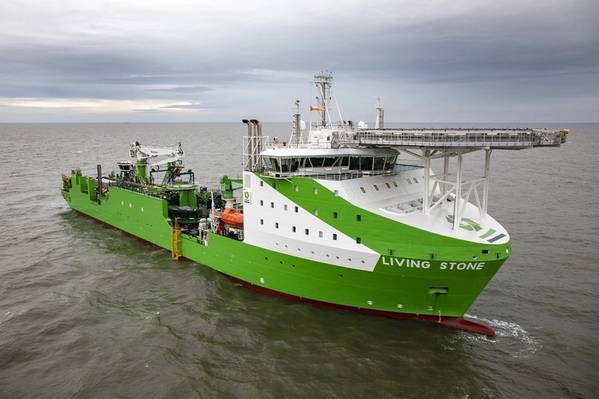
The installation of export cables at the world's largest offshore wind farm, Hornsea One in the North Sea off the coast of England, has been completed several months ahead of schedule, Danish operator Ørsted announced Tuesday.
With offshore export cables totaling 467km, plus an onshore cable route of 38km connecting each of the three strings to the national grid, it is the longest AC offshore wind export cable system ever to have been installed. The cables were manufactured by NKT at their facilities in Cologne and Karlskrona.
Tideway BV installed the three landfall cable sections using sub-Contractor VBMS and their vessel Ndurance. The remainder of the cable sections were laid using Ocean Yield’s vessel Connector, and later Tideway’s own vessel Living Stone.
The Connector has two large turntables with capacity to hold up to 6,000 and 3,000 metric ton cables, and has laid subsea cables since 2012 in a range of different water depths. For this job, the Connector lay-system was been replaced with a bespoke back deck cable lay spread designed and installed by Tideway for the Hornsea export cable project.
The Living Stone, which came into operational this year, is equipped with a dual-lane cable installation system, consisting out of two cable highways - one for laying the cable and one where the next cable can be simultaneously prepared and have the cable protection system (CPS) installed. This reduces the time needed for preparing the cables, minimizes the manual handling and risk of damaging the cable and increases the vessel’s workability.
The 1.2GW capacity Hornsea One, a 50/50 joint venture between Ørsted A/S and Global Infrastructure Partners, is a record-setting project in more ways than one. When fully operational in 2020, its 174 Siemens 7MW turbines will generate enough clean electricity for well over one million homes. The electricity generated out at sea will pass through one of three offshore substations, before being carried by three high voltage subsea export cables (245kV), via the reactive compensation station, to shore.
“This record-breaking project is a step up in scale from the offshore wind farms we have today,” Duncan Clark, program director for Hornsea Projects One and Two. “It will be the first offshore wind farm in the world with a capacity over 1GW, and at 120km out to sea, we are pioneering new technology and really at the forefront of scaling up clean energy infrastructure with each phase we complete.
“Over 35 vessels were involved in delivering the installation, which was conducted safely and efficiently by all. An incredible feat of logistical coordination, and truly a landmark achievement for both the project and the growing offshore wind industry across the globe.”
Termination and testing is being completed ahead of schedule, and is expected to conclude within the first months of 2019.
In November, Ørsted announced that more than 100 of the 174 foundations have now been installed, and turbine installation is expected to commence in Q1 2019.



